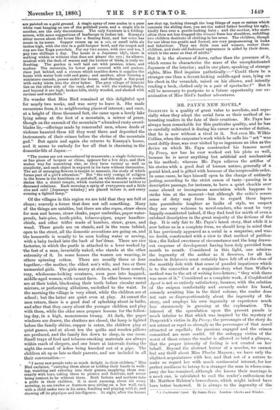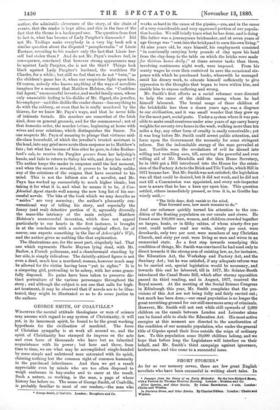MR. PAYN'S NEW NOVEL.*
INGENUITY is a quality of great value to novelists, and espe- cially when they adopt the serial form as their method of in- teresting readers in the fate of their creations. Mr. Payn has always been remarkable for this particular quality, and he has so carefully cultivated it during his career as a writer of fiction, that he is now without a rival in it. Not even Mr. Wilkie Collins, when the carpenter's work which he calls his " art " was most deftly done, was ever visited by so ingenious an idea as the- device on which Mr. Payn constructed his famous novel By Proxy, nor has he ever worked out his plots so well,. because he is never anything but artificial and mechanical in his method; whereas Mr. Payn relieves the artifice of his stories with a good deal of human nature, generally of a genial kind, and is gifted with humour of the irrepressible order.. In some cases, he lays himself open to the charge of untimely jesting, according to the strict canon of taste—pausing in a descriptive passage, for instance, to have a quiet chuckle over some absurd or incongruous association which happens to strike him at the moment—but although the critic's severe sense of duty may force him to regard these lapses into parenthetic laughter as faults of style, we suspect they are very welcome to novel-readers, who must be very happily-constituted indeed, if they find food for mirth of even a subdued description in the great majority of the fictions of the day. It is only fair to Mr. Payn's latest story, that while it is now before us in a complete form, we should keep in mind that it has previously appeared as a serial in a magazine, and was,- no doubt, constructed with a view to that method of publica- tion ; the linked sweetness of circumstance and the long drawn- out suspense of development having been duly provided from month to month. Considered in this light, one admires the ingenuity of the author as it deserves, for all his readers in Belgravia must certainly have left off at the close of the monthly dole with that sense of puzzled impatience which, is to the concoction of a magazine-story what Sam Weller's method was to the art of writing love-letters ; " they wish there was more of it." Considered as a complete work, A Confidential Agent is not so entirely satisfactory, because, with the solution of the enigma comfortably and securely under his hand, serenely awaiting him in the third volume, the reader does not care so disproportionately about the ingenuity of the story, and employs his own ingenuity or experience much less strenuously in guessing at the explanation. The interest of the speculation upon the present puzzle is much inferior to that which was inspired by the mystery of Penycuick's victim in By Proxy ; the personages of the story do not attract or repel so strongly as the personages of that novel' attracted or repelled ; the passions engaged and the crimes committed are more sordid. Of the unhappy victim of the worst of those crimes the reader is allowed so brief a glimpse, that the proper intensity of feeling is not created on her behalf. • Beyond the abstract horror of a murder, we cannot feel any thrill about Miss Phoebe Mayson ; we have only the slightest acquaintance with her, and that not of a nature to make us regard her with much sentimental interest, for her perfect readiness to betray to a stranger the man in whose com- pany she has remained, although she knows their marriage is a mock one, is calculated to cool the reader's enthusiasm for Mr. Matthew Heiston's benevolence, which might indeed have been better bestowed. It is always to the ingenuity of the- • A Confidential Agent. By James Nye. London: Chatto and Whiclus.
author, the admirable cleverness of the story, of the chain of events, that the reader is kept alive, and this in the face of the
fact that the theme is a hackneyed one. The question from first to last is, what has become of Lady Pargiter's diamonds? Did not Mr. Trollope make everybody in a very big book ask a similar question about the disputed " paraphernalia " of Lizzie Eustace, revealing to his readers only the fact that Lizzie her- self had stolen them ? And do not Mr. Payn's readers feel, in consequence, convinced that however strong appearances may be against Lady Pargiter, she is not the thief ? Things look black against Lady Pargiter's husband, the worthless Sir Charles, for a while ; but still we feel that we do not " burn," as the children's game has it, when our suspicions light upon him. Of course, nobody who knows anything of the ways of novelists imagines for a moment that Matthew Helston, the " Confiden- tial Agent," unsuccessful inventor, and model family-man, whose only unamiable feeling is his dislike of Mr. Signet, the jeweller, his employer—and this dislike the reader shares—has anything to do with the robbery, or even that he is really murdered by the thieves, for we know Mr. Payn's ways, and that he never kills 3ff intimate freinds. His murders are somewhat of the Irish kind, done on general grounds, and for the commonweal; not of that domestic order, the. murder intime, beginning at home with wives and near relations, which distinguishes the Saxon. No one suspects Mr. Payn of meaning to plunge that virtuous mid- dle-class household, of which the jeweller's trusted assistant is the head, into any grief more acute than suspense as to Matthew's fate ; but what has become of him after he goes, in John Ruther- ford's cab, to receive the Pargiter parure from her ladyship's hands, and fails to return to Sabey his wife, and Amy his sister ? The author keeps the reader in suspense until the last moment, and when the secret is revealed, it proves to be totally unlike . any of the solutions of the enigma that have occurred to his mind. This is not the loftiest aim of a novelist, and Mr. Payn has worked up successfully to much higher ideals ; but -taking it for what it is, and what he means it to be, A Con- fidential Agent stands well among the now long list of his suc- cessful novels. The bits of the book which we may describe as " asides " are very amusing ; the author's pleasantly con- versational way of telling his story, and especially the fanny (and real) detective portion of it, agreeably diversify the maze-like intricacy of the main subject. Matthew Helston's unsuccessful invention, which does not appeal particularly to our hearts in the first instance, is brought in at the conclusion with a curiously original effect, for of course, one expects something in the line of Arktoright's Wife, and the author gives us nothing like that explanation.
The illustrations are, for the most part, singularly bad. That one which represents Phoebe Mayson lying dead, with Mr. Barlow, a French policeman, and a chambermaid standing by her side, is simply ridiculous. The daintily-attired figure is not even a dead, much less a murdered, woman, however much may be allowed for the victim having been "put to rights." It is a simpering girl, pretending to be asleep, with her arms grace- fully disposed. No pains have been taken to preserve dis- tinct portraiture of the various personages throughout the story; and although the subject is not one that calls for high- art treatment, it may be observed that if novels are to be illus- trated, they might be illustrated so as to do some justice to the authors.



































 Previous page
Previous page